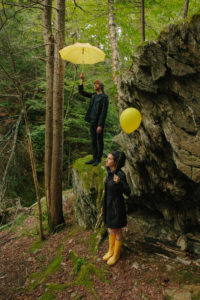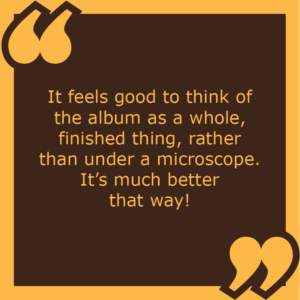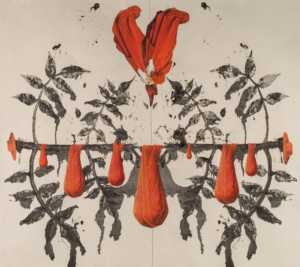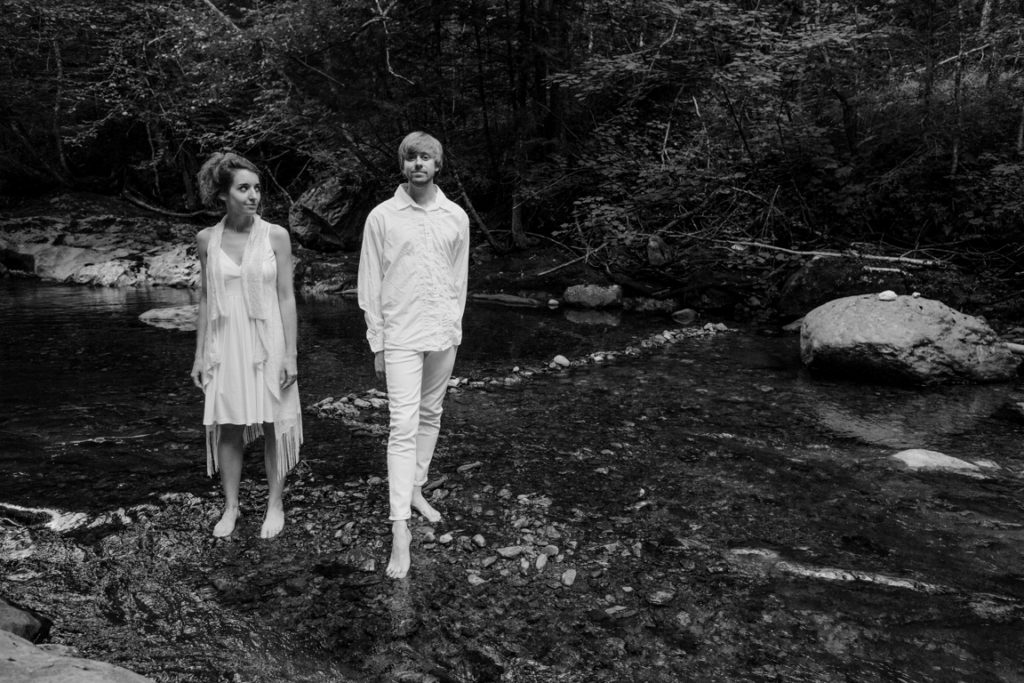
Artist: Cricket Blue
Socials: Twitter/Instagram/Facebook
Hometown: Burlington, VT
TrunkSpace: Your latest album, “Serotinalia,” dropped May 10. As artists, is it difficult relinquishing control over your work and releasing it into the world? Does it ever feel overwhelming?
Heaberlin: Honestly, it feels nice. We started working on the album a year and eight months before the release (and started writing the songs years before that in some cases) and it feels great to be out of the stage where we would listen to the same song we’d heard a thousand times saying, “At two minutes in, did I say the word ‘garbage’ too strangely? Should we swap it out?” or “I know I thought the trumpet was too quiet last listen through but now I think it’s too loud.” It feels good to think of the album as a whole, finished thing, rather than under a microscope. It’s much better that way! And we’re so happy that people are interacting with the album now in their own ways.
TrunkSpace: The title of the album is so interesting, and we wonder, are these songs – the messages and meanings behind them – a response to the environment we’re currently living in? Would these songs – COULD these songs – exist if the album was conceived in a different time or place?
Heaberlin: That is such a great question! I mean, the title of the album and the fires in some of the songs invoke the idea of forest fires, and it just so happens that the country was devastated by forest fires as we were recording. If people want to connect those things we certainly welcome them to, though that was not our original intention. But I think our subject matter is more about individuals’ emotional landscapes than physical landscapes or even political landscapes. I won’t speak for Taylor, but a lot of the characters I put into my songs on this album are struggling with validation; they are women who are able to be validated only by things that make them feel unsafe or sad or angry or guilty. I certainly couldn’t have written about that subject outside of the cultural climate we’re in, but I think that’s a paradox women have lived with for a long time culturally, and it’s going to be very slow to correct. Like, I’m pretty sure it’s too late for my generation. But I hope, you know, 20 years down the line that young women will find that idea un-illuminating, and sort of heavy-handed. So in that way, I hope it is a product of its time.
welcome them to, though that was not our original intention. But I think our subject matter is more about individuals’ emotional landscapes than physical landscapes or even political landscapes. I won’t speak for Taylor, but a lot of the characters I put into my songs on this album are struggling with validation; they are women who are able to be validated only by things that make them feel unsafe or sad or angry or guilty. I certainly couldn’t have written about that subject outside of the cultural climate we’re in, but I think that’s a paradox women have lived with for a long time culturally, and it’s going to be very slow to correct. Like, I’m pretty sure it’s too late for my generation. But I hope, you know, 20 years down the line that young women will find that idea un-illuminating, and sort of heavy-handed. So in that way, I hope it is a product of its time.
TrunkSpace: The album is a literary journey in song form and was inspired by the likes of Alice Munro and Dylan Thomas. With that said, do you view each song as a chapter of the story, or is each song it’s own book?
Heaberlin: When we were writing the songs they were each their own individual “books” as you say. When we started placing them together and choosing our song order, there were certain resonances with some songs, and it started to be fun to view them as different perspectives on the same situation. For instance, if you think of “June” and “Psalm” being about the same breakup with different degrees of intimacy and self-denial happening in the narration, they layer together nicely – like the narrator is going through the various stages of grief. My favorite pairing of songs, though, is “Corn King” into “Little Grays.” “Corn King” is all about the inevitable demise of John Barleycorn when he is burned alive as a sacrifice to his lover, the deified earth. He dies to become the soil that holds and nourishes her new seeds, and there’s this implication that he’s erased again and again every year and he’s just as naive every cycle and the whole thing is quite tragic. “Little Grays” is a song I wrote about feeling elated and moved upon finding a favorite pair of scissors I thought I had lost when my house (actually) caught on fire. But if I pretend that the fire in “Little Grays” is the same fire that’s in “Corn King,” it’s an alternate ending to “Corn King” from an outside perspective that says: “Look, you’re okay! That was scary and I am so glad you’re alive! I love you!” It’s nice because the two songs contrast each other musically: “Corn King” is the most complicated song and arrangement on the album and it’s 12 minutes long. “Little Grays” I wrote basically in one sitting, it has no arrangement or even harmonies and it’s not even two minutes long.
TrunkSpace: The amazing thing about music and art in general is that the same piece of work can mean different things to different people. Does that also apply to both of you? Does this album and the work you both put into it mean something different for each of you? Does it represent different things?
Smith: Inevitably, I’m sure we each connect with songs the other person has written in a way that’s different from how the writer does. We do spend a fair amount of time trying to explain to each other where we’re coming from with something we’ve written, both in terms of what we were feeling or thinking about when we wrote the song, and what we’re hoping the song accomplishes for the listener. A lot of that happens while we’re revising, so often I’ll come to Laura and say something like, “Here’s what this line means, or what I want it to mean, but does it actually succeed at that?” And then she’ll think about it and give some suggestion that’s better! So sometimes she ends up putting in the meaning that I was trying to. Or sometimes, after talking about it, we’ll decide it’s better to go off in some totally different direction. So, in short: we do try to align our visions, and sometimes that’s because we’ve collaborated closely on some aspect of a song, but no doubt even in the final product Laura and I have different interpretations of and connections to the songs.
 For listeners, I think the songs likely “mean” as many different things as people who listen. Actually, I often don’t think about what a song “means” as much as what a song “does,” since “meaning” kind of sounds like it should be unitary, but there’s nothing strange to me about thinking, “The song does this thing to Alice, and this other thing to Bob.” The magic isn’t in the music itself, right? The spark goes off at the intersection of the song and the listener.
For listeners, I think the songs likely “mean” as many different things as people who listen. Actually, I often don’t think about what a song “means” as much as what a song “does,” since “meaning” kind of sounds like it should be unitary, but there’s nothing strange to me about thinking, “The song does this thing to Alice, and this other thing to Bob.” The magic isn’t in the music itself, right? The spark goes off at the intersection of the song and the listener.
TrunkSpace: What are you most proud of with the album?
Heaberlin: We are really happy with the album, and so pleased to have gotten to work with so many amazing people on it. (Beehive Productions for the recording, the additional musicians we brought in are all amazing, our album artwork artist, etc.) One thing I think we are both really proud of is that we really did so much of it ourselves. We wrote all of the arrangements for the other instruments ourselves, and Jeff from Beehive allowed us to do a lot of our own editing on the album. We had the luxury of time, which helps a lot, but I would say that our level of involvement in every stage of the process is pretty unusual. And we learned so much along the way!
TrunkSpace: We talk with musicians all of the time about how albums become chapters of their lives – yearbooks that look back on their lives and spotlight moments in time. With that being said, what do you think “Serotinalia” will mean for you 10, 20 or 30 years from now?
Heaberlin: Wow, well that is hard to predict. I think that the release of “Serotinalia” marks the end of our early career. We put out two EPs before this and we did a fair amount of touring, but I hope that this new album will mark the beginning of the meat of things for us.
TrunkSpace: You both met in an a cappella group. Was it creative love at first sight? Did you instantly click on an artistic level?
Heaberlin: Well, yes! We absolutely did! We were both doing our own songwriting thing at the time, and so that was an immediate bond between us. I think our friendship was truly sealed one evening a couple weeks after I had joined the group (Taylor was a semester ahead of me at school) when we were at some fun party our a cappella group was throwing and Taylor and I found ourselves in a different room from everyone else discussing what Jeff Mangum’s best lyrics were on “In the Aeroplane Over the Sea.” We each music directed the group at various times, and when we were recording our a cappella album I was music director and Taylor was general manager, so you could say “Magic House” by the Middlebury Mamajamas was truly the first album we put out together.

TrunkSpace: Has where you’re based – Vermont – directly influenced your music and writing? Does a setting infiltrate the process, even on an organic level?
Smith: There is something kind of stuck-out-of-time of parts of Vermont. There’s plenty of opportunities to wander and encounter long stretches of unbroken forest or farmland, old graveyards, tiny towns with one store, weird idiosyncratic local landmarks. I do think it’s fertile ground to get the imagination humming, especially for the sorts of characters and situations that pop up on this album. A few of our songs do (in our minds) take place at literal places near where we live, though we don’t name them outright.
TrunkSpace: What has been the highlight of your musical career thus far?
Smith: Honestly, I think it’s probably putting this record out! But we’ve already talked a bit about that. Perhaps more specifically: I think getting to write for, practice with, and perform with the incredible musicians who recorded with us on “Serotinalia,” especially our string trio, has been a very long-time dream come true. Laura and I enjoy playing as a duo very much, but while I’m writing a song I often sort of hear a ghost version of the True Arrangement in my head — little countermelodies in the background, how the bass end would enter or fall or go silent, the timbre of a trumpet on this riff or whatever. Having a little “orchestra” this time around, and so getting to learn how to translate the vague sonic impressions I had into something concrete that actually sounds good and is playable was really new and challenging but also incredibly rewarding, and we really lucked out to have found players who just totally nail it.
TrunkSpace: Time machine question. If you could jump ahead 10 years and get a glimpse of what your career looks like a decade from now, would you take that journey? If not, why?
Smith: Oh, probably not! Feeling like our goals are either a) hopeless or b) a foregone conclusion both seem like they’d sap some of the adventure out of the thing. That space of not knowing what to do or what will happen next is where you’re able to have fun.
“Serotinalia” is available now.


